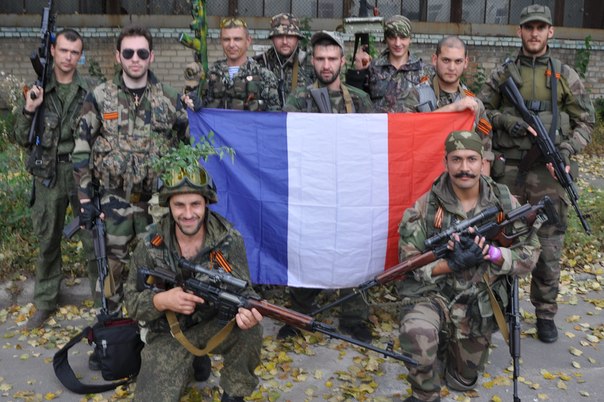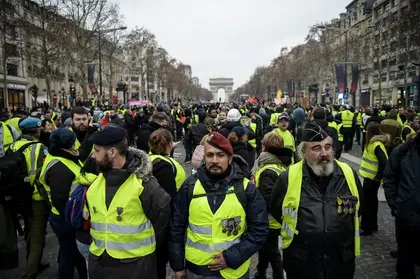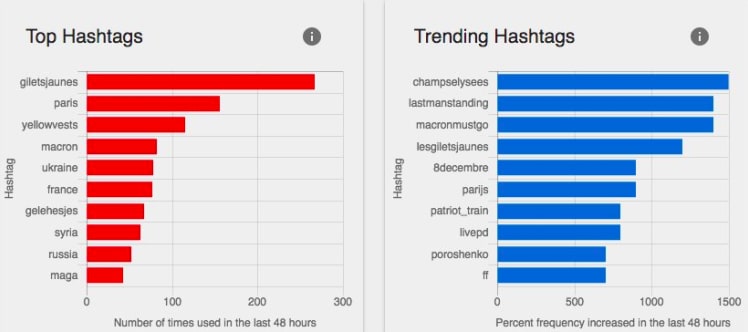In 2014 and 2015, the French national and Afghanistan war veteran Victor Alfonso Lenta was in Ukraine’s eastern Donbas region where he, with a handful of compatriots, worked to establish a so-called “Légion Française à Donbass” – or French Donbas Legion.
They trained and fought alongside Russian forces and their proxies, while working to attract other foreign “volunteers,” during some of the bloodiest episodes of Russia’s hybrid war against Ukraine.
- Find the most current war in ukraine update in the Kyiv Post’s daily news reports published today.
- Obtain the most current Ukraine news articles released today.
JOIN US ON TELEGRAM
Follow our coverage of the war on the @Kyivpost_official.
Back then, Lenta briefly became the darling of pro-Russian broadcasters and interviewers, often telling Russian-language outlets that he and his comrades were defending Donbas civilians from what he called “Ukrainian terror” and “fascist aggression.”
He admitted to fighting Ukrainian soldiers and called on more foreign volunteers to come and do the same. In photos shared of Lenta online at the time, his weapon of choice seemed to be a high-powered sniper rifle.
In one such interview, Lenta boasted that his Russian comrades in Donbas called him the commandant, or commander.
“It’s a great human and military experience – you have to live it,” he told an RT journalist (in French) in 2015, urging more foreign volunteers to head to eastern Ukraine.
“So you are not planning to return to your country?” another Russian interviewer had asked Lenta, a few months earlier in 2014.
“France supported the decision of Kyiv to conduct the so-called ‘anti-terrorist’ operations,” he replied. “It turns out, that under French law, we can easily be considered terrorists and will undergo trial (if we return).”

French anti-government protests
Today, Lenta is back in France and living freely, having taken what he describes as his anti-globalist, anti-NATO struggle to the streets of Paris. No action against him has been taken by the French authorities.
On Jan. 12, he was spotted at the front of a Paris march, decorated in French war medals and military beret, having taken on a self-styled “head of security” role for the Gilets Jaunes, or “Yellow Jackets” protest movement.
Yellow Jacket protests have spread across France since November 2018 as some French citizens have called for economic reforms amid rising fuel prices, high costs of living and recent, unpopular tax reforms.
While mostly peaceful, parts of the movement have been hijacked by a violent, anti-establishment minority that have wreaked havoc in French cities, particularly the capital, as fringe groups clashed with police, looted businesses and caused billions of euros worth of property damage.
Some observers have said there’s evidence that demonstrates a level of Russian interference or opportunism at work throughout the French protests.
Russian-backed rebels favor the far-right
Strong pro-Russian sentiment, opposition to NATO and the EU, as well as support for the so-called Donetsk People’s Republic, or DPR – a terrorist organization according to the Ukrainian government in Kyiv – has spread among France’s far-right groups in recent years, and they in turn have infiltrated the country’s Yellow Jacket protest movements.
Victor Lenta, for his part, has strong ties to extreme, ultra-nationalist, far-right groups that also attract people who favor the Russian proxies in eastern Ukraine.
According to French newspaper reports from 2014, as a member of the far-right bloc Identitaire de Toulouse, Lenta, allegedly referred to as “uncle Adolf” by his comrades, took part in multiple “ratonnades” – racist attacks, in English – that included the alleged firebombing of a mosque while he was a soldier based in Carcassonne, southern France, in 2008.
Later, according to French newspaper La Depeche, Lenta and his comrades would boast online of having had their far-right group – founded in Belgrade, Serbia – recruited by the so-called DPR to attract and train European soldiers to fight against Ukraine in the Donbas.
Now, having caused chaos in eastern Ukraine, some European fighters who have returned home could have brought their violent, anti-European ideas with them.
Russian proxies in Paris?
In November, videos were shared across social media that were alleged to show Russian-speaking looters, along with French-speaking rioters, in masks and black clothing ransacking shops in Paris as protests descended into violence. While some observers at the time said the alleged rioters in the videos were using Russian phrases, others have disputed this and said they were not.
At other Paris protests in early December, men known to be members of French far-right groups with ties to Russian proxies in the Donbas were photographed displaying flags of the so-called Donetsk People’s Republic, or DPR. Ukrainian journalists from the UNIAN news agency identified at least three French men at yellow vest protests who had ties to the DPR, and said they had also visited the Donbas during recent hostilities.
On Dec. 8, a spike in Russian language social media accounts – some 600, according to French authorities – with links to the Kremlin or Russian troll factories posting messages with “giletsjaunes” hashtags, prompted investigators to open an official probe into a possible Kremlin hijacking of the protests, France’s foreign minister Jean-Yves Le Drian said.
Russia’s Kremlin-backed state broadcasters RT – formerly known as Russia Today – and Sputnik, both under fire in France for allegedly spreading misinformation, have also been highly active throughout the protests, with some observers saying they have overstated and “luxuriated” accounts of police brutality, while stoking fears of possible terrorist attacks.
But for some observers, especially French and Ukrainian commentators on social media, the biggest concern is how and why a mercenary who volunteered for the forces of the Russian-backed DPR – accused by the United Nations and NGOs of war crimes and widespread human rights abuses – has been able to return to France and take a leading part in protests on the streets of Paris.
Lenta fought against Ukraine
At the head of a protest march in Paris on Jan. 12, Victor Lenta – wearing the maroon beret of France’s parachute regiment – told the HuffPost’s French language edition that he had formed and was leading a group of security volunteers to protect protesters against violence and “provocations” by the police.
He gave HuffPost a false name, although when the newspaper published his picture eagle-eyed netizens on Twitter, noticing his distinctive facial hair and birth mark, quickly saw who he really was.
And it’s not the first time that Lenta, since his discharge from the French military where he reportedly served in Chad, Ivory Coast and Afghanistan, has taken the freelance initiative and formed a volunteer force.
From 2014 through to late 2015, he spent about 16 months fighting Ukrainian soldiers alongside DPR militias and Russian forces in the Donbass.
There, he formed a volunteer squad of French fighters – calling it the French Legion of the Donbas – with some of his fellow fighters also being former French soldiers.
In October 2015, Lenta told RT that perhaps ten French fighters had remained in the Donbas when he returned to his country, with those volunteers having been absorbed into the so-called DPR’s army, which falls under Moscow’s command structure, according to experts.
In Sep. 2014, at the height of hostilities between Russian proxies, volunteers and Ukrainian loyalist forces in the Donbas, Lenta gave a telephone interview to French newspaper Le Point where he rejected the assertion that he was a far-right extremist, instead calling himself a “Eurasist” and a “nationalist-revolutionary.”
He told the newspaper that he and his men were fighting for a “great continental bloc, from Brest (in north-western France) to Vladivostok (far-eastern Russia) with traditional values, family and faith… Europe, as the land of Europeans, (is) a historical fact,” he added.
The Kyiv Post contacted the State Security Service of Ukraine, or SBU, and the French National Police for comment regarding Victor Alfonso Lenta and other French fighters from Donbas who returned home. None had responded by the time this article was published.
Correction: An earlier version of this article contained a sentence that said videos shared on social media were alleged to show Russian-speaking looters in Paris. We have added an extra video for our readers in that sentence but also added an extra sentence explaining that, despite the allegation, some viewers have disputed the content and said they do not hear any Russian spoken.
You can also highlight the text and press Ctrl + Enter





